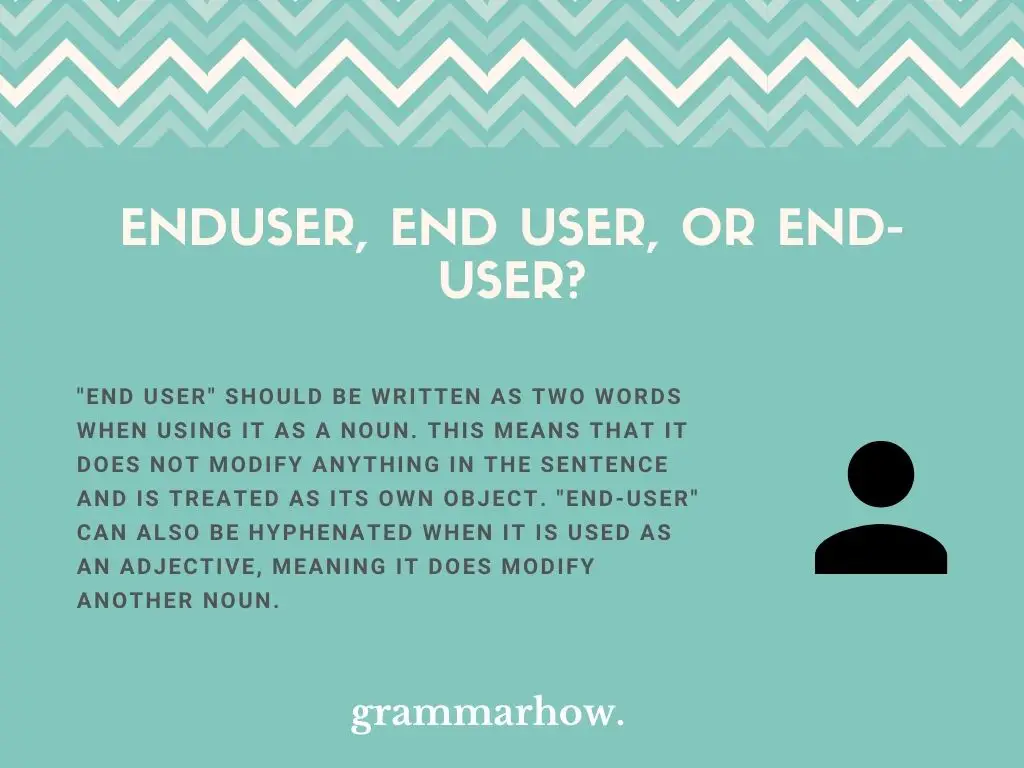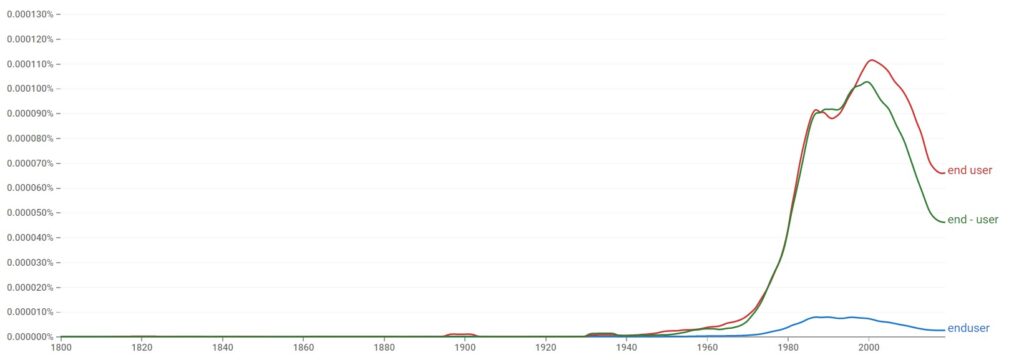Before writing about an “end user,” it would help to know how to spell it. This article will look at how it should be presented. Is it one or two words? Or does it make more sense to see it as a hyphenated form?
End user vs. End-user vs. Enduser
“End user” should be written as two words when using it as a noun. This means that it does not modify anything in the sentence and is treated as its own object. “End-user” can also be hyphenated when it is used as an adjective, meaning it does modify another noun.

According to Google Ngram Viewer, “end user” and “end-user” are almost identical in usage. The two-word variation is slightly more popular, but the results clearly show that both are correct forms. It depends entirely on how you use them.

In The Cambridge Dictionary and The Oxford Dictionary, both “end user” and “end-user” are recognized as spelling variations. “End user” is clearly defined in both dictionaries as a noun, showing that it is a standalone object.
They also both show that “end-user” is correct as an adjective form. This mostly applies when the noun it modifies comes directly after it.
Here are some examples to clear up any confusion you might have:
- Noun: We need to look into this to suit the needs of the end user.
- Adjective: The end-user agreement doesn’t give us much hope for success.
Is “Enduser” One Word?
While the other two forms are correct, “enduser” is not correct as a one-word option. You cannot combine “end” and “user” because it takes away from the intended meaning of what we’re looking for from either the two-word or hyphenated options.
You might benefit from checking these examples out to help you:
- Correct: How are we going to demonstrate how this works to the end user?
- Incorrect: We haven’t found any reason for the enduser to distrust the product we are selling.
- Correct: If you’re going to go over the end-user protocols, I think I should be here to listen to them.
- Incorrect: We don’t have enough enduser testers to allow us to get a decent result out of this.
Is “End user” Two Words?
We can write “end user” as two words when it is a noun. This means we are using it as a standalone object that does not modify anything else in the sentence. When we combine “end” and “user” in this way, we can put a specific meaning on them that helps the reader.
These examples should help you to make more sense of it:
- If you’re going to discuss how it affects the end user, perhaps we should put some trials in place.
- Don’t worry; we have made this with the needs of the end user in mind throughout.
- The end user is going to be the most important aspect of getting this project right.
- If you want to act as a dummy end user, that’s your prerogative!
Is “End-user” Hyphenated?
“End-user” should be hyphenated when we are modifying another noun. This means it is used as an adjective, and we can use AP Style rules to combine “end” and “user” when they are both modifying the same word in the sentence.
The AP Stylebook guidelines teach us that hyphens work as linkers. We use these linkers to combine multiple words together when they all work to modify the same noun (usually, the noun comes directly after the hyphenated form).
Here are some examples that should help you with it:
- If you would like to read the end-user agreement, I will happily provide you with it.
- The end-user license has been the hardest thing for us to get our hands on.
- If you’re an end-user tester, we would be more than happy to hear what you have to say.
- Our end-user problems are all connected, but nobody knows how to fix them.
Is “User” Capitalized In The Word “End-User”?
“End-user” does not need either part of the hyphenated form to be capitalized. It is not a proper noun, so capitalizing is the least of our concerns. However, if you write it in a title, there is no reason why you can’t capitalize both parts of the hyphen.

Martin holds a Master’s degree in Finance and International Business. He has six years of experience in professional communication with clients, executives, and colleagues. Furthermore, he has teaching experience from Aarhus University. Martin has been featured as an expert in communication and teaching on Forbes and Shopify. Read more about Martin here.
